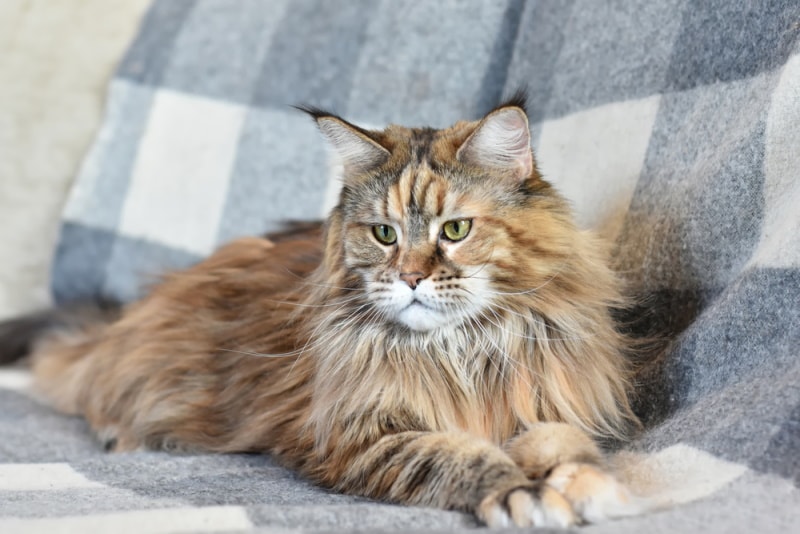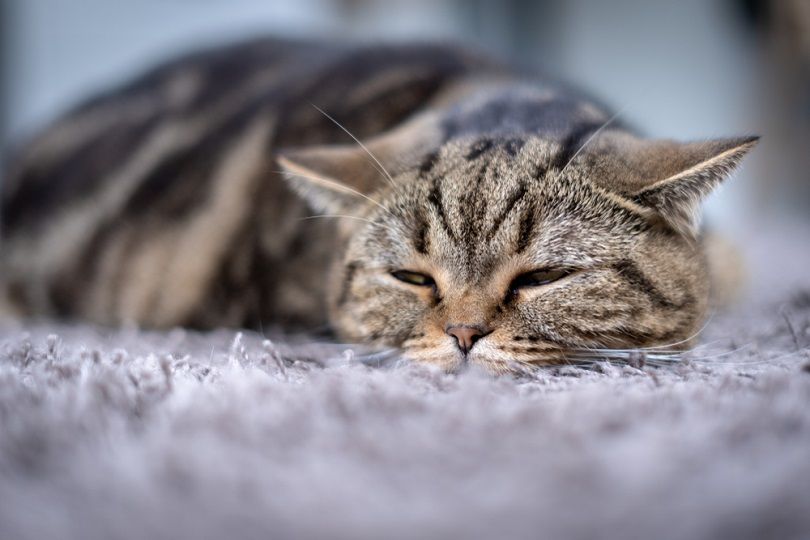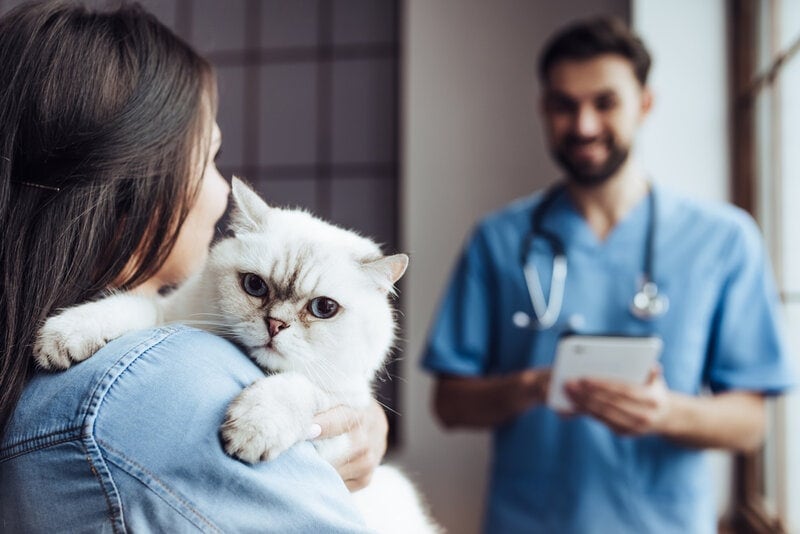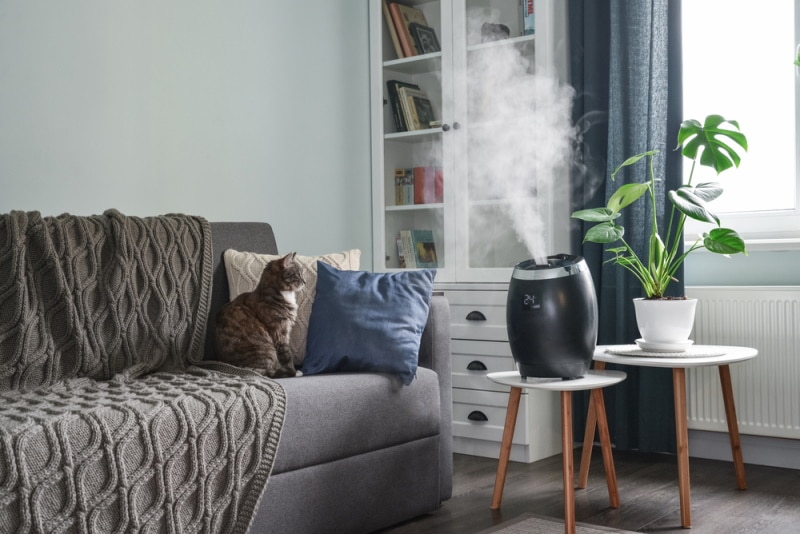Can Cats Get Kennel Cough? Vet-Approved Facts & FAQ

Updated on

As cat parents, we always strive to obtain knowledge on diseases that can affect our feline friends. At times, we may stumble across an illness or condition that is associated with other animals and wonder if our cats are also susceptible to them. Kennel cough is an example of one of those illnesses.
Kennel cough is a respiratory ailment often associated with dogs. It is caused by an inflammation of the upper airways. However, cats can get kennel cough, too. Therefore, it is important to know how kennel cough might present itself in our feline friends.
Below, we tell you everything you need to know about kennel cough in cats.
What Is Kennel Cough?
Kennel cough, also known as infectious tracheobronchitis, is a respiratory ailment often associated with dogs that results from the inflammation of the upper airways. It is a mild disease that normally improves on its own. However, it can progress into other complications in puppies and weakened, ill, or aged adults. The disease spreads rapidly among dogs that are housed in close confinement, such as kennels, and the most typical sign of this disease is a harsh, dry cough – hence the name kennel cough.
Like dogs, cats too can get infected by kennel cough. Those at a higher risk of infection are cats who live in crowded places, unvaccinated cats, cats in contact with infected dogs, and those who constantly travel or venture outdoors. Sometimes, it is caused by the bacteria Bordetella bronchiseptica, which is why the disease is also referred to as Bordetella in cats.1 At other times, the kennel cough might set in due to another infection in your cat’s respiratory system.
The seriousness of the illness in cats depends on certain factors like your cat’s age, immunity status, general health condition, vaccination status, and lifestyle. Therefore, it is imperative to understand the causes, signs, and potential treatment options.

How Cats Get Kennel Cough
Kennel cough is a contagious disease that can spread from one pet to another. That means cats can get kennel cough from dogs and vice versa. They may also contract the illness from an infected cat. The illness can be transmitted through coughing and sneezing, direct contact, or shared items such as bowls and toys.
Certain environmental conditions, such as poor hygiene and ventilation, can increase your cat’s chances of getting infected. Cats that have a flat face, such as Persians, have differently shaped respiratory tracts and are at a higher risk of infection. Cats with genetic defects, such as a cleft palate, are also considered higher risk individuals for kennel cough and other respiratory ailments.
Additionally, cats with compromised immune systems, unvaccinated cats, young kittens, ill cats, elderly cats, and cats with underlying health issues or conditions are more susceptible to infections.
Signs of Kennel Cough
There isn’t a sign that is exclusive for kennel cough in cats, as these signs are shared with other respiratory illnesses, too.
If your cat has kennel cough, they may show some of the following signs.
- Sneezing
- Runny nose with discharge from one or both nostrils
- Fever
- Swollen, puffy eyes
- Coughing
- Discharge from the eyes
- Drooling
- Ulcers in the mouth
- Lethargy
- Loss of appetite or a reduced appetite
- Difficulty breathing

When to Visit a Vet
In healthy dogs, kennel cough can be a mild, self-limiting infection that may pass away with time and not require hospitalization. However, in cats, any signs of a kennel cough, no matter how mild they may seem, require veterinary attention.
The signs of kennel cough are like those of illnesses such as asthma, influenza, and even heart disease. Additionally, Bordetella infections in cats can progress to long-term illness and lead to other problems or serious conditions if left untreated. Therefore, taking your cat to the vet for a correct diagnosis instead of making assumptions is imperative.
Diagnosis Of Kennel Cough In Cats
Observing signs can lead you to suspect that your cat has kennel cough or another respiratory ailment. But only a qualified vet can make a definitive diagnosis.
Your vet will ask you questions about your cat’s medical history and conduct a physical examination of your cat. In addition, your vet may opt for other diagnostic tests such as X-rays, bloodwork, sample collections from your cat, and any other tests needed for other issues your cat might have.
Using the information from the physical examination and diagnostic tests, your vet will formulate a treatment plan for your cat and advise you on appropriate home care, follow-ups, and preventive guidelines.

How Kennel Cough Is Treated
In cats, it is essential to always consult a vet whenever signs of a respiratory issue appear. This is because untreated respiratory issues can develop into long-term issues or give rise to other problems, some of which can be very serious or potentially life-threatening.
Your cat’s veterinarian will prescribe medication based on their individual needs. These include supportive medication, supplements, and possibly antibiotics.
Medication is often sufficient for cats that are just slightly unwell. However, hospitalization may be necessary in cases where the cat develops severe signs, or if your vet determines your cat might be too debilitated and needs additional monitoring.
Helping Your Cat Recover From Kennel Cough Faster At Home
As explained above, for kennel cough, your vet will formulate a treatment plan that is appropriate for your cat. Therefore, the first step towards treatment and recovery is taking your cat to the vet if you notice any signs of problems.
You should NEVER use OTC (over-the-counter) human medication in an attempt to treat your cat by yourself. This will do more harm than good.
That being said, there are several measures you can take at home to assist your cat with a speedy recovery. These include the following:
- Isolate the Cat – Keep your cat in isolation to prevent the illness from spreading to you or other pets in the home. Also, sanitize any surface your cat touches, including bowls, scratching posts, and toys.
- Administer Prescribed Medication – Complete the prescription medication that your vet has prescribed for your cat. Eye drops, nose drops, prescribed supplements, and other treatments will speed up your cat’s recovery. Ensure that you fully complete any prescribed antibiotic course, even if your cat appears completely healthy/normal before the course is over.
- Provide Adequate Rest – Rest is essential while your cat recovers from kennel cough. So, provide a conducive environment for your cat to relax at home. Also, cut back on play and exercise to facilitate quick recovery.
- Offer Proper Nutrition – Proper nutrition is essential for recovery. Therefore, ensure that you provide your feline friend with enough food and fresh water. Nutritional supplements may boost their immune system. These supplements should always be given with a vet’s permission, especially if your cat has prescription medication(s).
- Groom Your Cat – Healthy cats frequently groom themselves as part of self-care. If your cat is unwell, they may not feel like doing so. You can help them in such times by grooming them.
- Keep the Home Clean – Exposing your cat to excessive dust and smoke can interfere with healing. As such, you should keep your home clean and well-ventilated. Also, avoid scented products such as cleaning solutions and fresheners.
- Use a Humidifier – Placing a humidifier in the room can moisten and warm the air, thus helping with stuffy noses. Do not place any essential oils or aromatherapy products in the humidifier. Never leave your cat alone with a humidifier, as your cat could knock it over by accident and hurt themselves in the process.
- Consider Steam Therapy – Allow your cat to stay in a closed bathroom with you while you’re taking a hot bath or shower. The steam may help clear mucus and reduce stuffiness. However, never leave a cat unattended near hot water. Never pour hot water directly onto your cat’s face in an attempt to help clear out stuffy noses or sinuses.

How to Prevent Kennel Cough
As always, prevention is better than cure. Luckily, there are several measures you can take to minimize the risk of your cat getting infected.
First, it is advisable to keep your cat indoors whenever possible. That way, it will have less exposure to other infected pets.
Proper hygiene is also essential in stopping the spread. So, ensure you wash your hands after touching other pets, especially if they are sick.
Discuss preventive medication in the form of vaccinations for your cat with your veterinarian. Vaccinations exist for several respiratory ailments that are common in cats. They can help your cat build strong immunity against diseases to lower the risk of serious illnesses.
Nutrition plays a vital role in your cat’s life to ensure proper growth, development, and immune system competence. Cats that are nutritionally deprived are more prone to illnesses, including respiratory illnesses such as kennel cough. Discuss your cat’s nutrition with your veterinarian or a cat nutritionist to ensure that you are providing them with a species-appropriate diet that is adequate for their individual needs.
Finally, ensure that you take your cat to the vet for regular check-ups and keep them up to date on all of their vaccines.
 Summary
Summary
To sum it up, cats can get kennel cough. Cats at highest risk are those that have a compromised immune system, are unvaccinated or unwell, or have underlying health issues. You should visit a vet promptly if your cat develops signs of any respiratory issues.
Preventing your cats from roaming, providing proper nutrition and care, practicing good hygiene and husbandry, and taking your cat for routine vet check-ups are key to minimizing the risks of exposing your cat to infectious ailments such as kennel cough.
See also:
Featured Image Credit: Akifyeva S, Shutterstock













